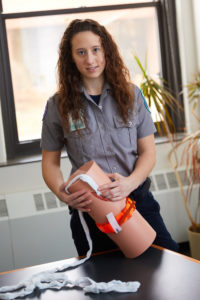Posted p.m. Sunday, Nov. 18, 2018

Precautionary effort is part of a national awareness campaign.
Precautionary effort is part of a national awareness campaign
At a Gundersen trauma conference two years ago, UW-La Crosse senior Brittney Trybula heard stories about Sandy Hook Elementary School, Marjory Stoneman Douglas High School and other mass shootings. Had people on the scene received prior training and had access to triage materials, more lives may have been saved. It got the bio-medical, pre-physician assistant major from Neillsville thinking. After working at Gundersen Tri-State Ambulance for a year, Trybula took action to get the western Wisconsin region better prepared.“I thought it would be a good idea to be proactive rather than reactive,” she explains. “It’s probably only a matter of time before an incident like this hits La Crosse.” Trybula aligned with Stop the Bleed, a national program initiated by the U.S. Department of Homeland Security under President Barack Obama in October 2015, following the Sandy Hook shooting nearly three years earlier. The program cultivates grassroots efforts of encouraging bystanders to become trained, equipped and empowered to help in a bleeding emergency before professional help arrives. “It can be used in any situation that needs bleeding cessation,” she notes. Since Trybula proposed the program in La Crosse, she has worked with Gundersen Tri-State Ambulance, La Crosse first responders and community members. Her goal is to get Stop the Bleed kits added to all 120 automated external defibrillators — AEDs — in the community, and train a large number of first responders and others within the community. [caption id="attachment_53240" align="alignright" width="200"]“I thought it would be a good idea to be proactive rather than reactive. It’s probably only a matter of time before an incident like this hits La Crosse.”
 UW-La Crosse senior Brittney Trybula is training UWL professors, students, first responders and others in the community on how to use Stop the Bleed kits, which she is working to place in La Crosse area AED sites.[/caption]
The kits include disposable medical gloves, trauma shears, gauze, tourniquets, chest seals and military bandages — everything needed for a massive bleeding incident.
Tom Tornstrom, executive director of Gundersen Tri-State Ambulance, fully supports the effort — so much that he convinced the company to fund kits for all the AED locations.
“Our board of directors felt it was important to give back to the community,” says Tornstrom. “What a great idea that will benefit our community.”
Tornstrom hopes the kits will never be needed, but says it’s a sign of the times that they be available.
As she balances studies and part-time work, Trybula continues to train UWL professors, students, first responders and others in the community. “The main reason I initiated the project was because I want the community to feel prepared,” she says. “We can’t prevent accidents or people from mass shootings, but we do have the opportunity to be proactive.”
UW-La Crosse senior Brittney Trybula is training UWL professors, students, first responders and others in the community on how to use Stop the Bleed kits, which she is working to place in La Crosse area AED sites.[/caption]
The kits include disposable medical gloves, trauma shears, gauze, tourniquets, chest seals and military bandages — everything needed for a massive bleeding incident.
Tom Tornstrom, executive director of Gundersen Tri-State Ambulance, fully supports the effort — so much that he convinced the company to fund kits for all the AED locations.
“Our board of directors felt it was important to give back to the community,” says Tornstrom. “What a great idea that will benefit our community.”
Tornstrom hopes the kits will never be needed, but says it’s a sign of the times that they be available.
As she balances studies and part-time work, Trybula continues to train UWL professors, students, first responders and others in the community. “The main reason I initiated the project was because I want the community to feel prepared,” she says. “We can’t prevent accidents or people from mass shootings, but we do have the opportunity to be proactive.”